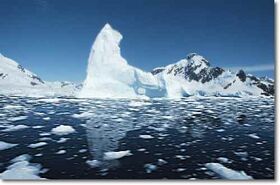
"Global warming" is a term for the rise in the average temperature of the Earth.
Effects[]
Rising global temperatures can cause many disasters. As temperatures rise, glaciers in polar regions melt, causing sea levels around the globe to rise. This puts coastal regions around the world at a risk of severe flooding and can cause entire islands to disappear under the rising water. Droughts and heatwaves become more common, causing the size of deserts to increase while the size of usable farmland decreases. Storms such as monsoons and hurricanes increase in size, frequency, and severity as the warmer atmosphere disrupts climate patterns.
Causes[]
To understand global warming, it's essential to understand the "greenhouse effect." When light from the Sun hits the Earth's surface, it re-radiates as heat, warming the planet. Some of this heat radiates back out into space while some of it is absorbed by certain "greenhouse gases" in the atmosphere. These gases absorb the heat then re-radiate it in all directions, essentially reflecting part of the heat back to the Earth's surface. By "trapping" some heat in this manner, the planet is able to stay warm enough to support life even when not constantly exposed to sunlight, such as at night.
Global warming is caused by a disruption in the greenhouse effect. Many human activities result in the over-production and emission of various greenhouse gases. When these gases are released into the atmosphere, they raise the amount of heat that gets "trapped" in the atmosphere, effectively causing the average global temperature to rise above normal levels.
In Fate of the World, the Earth's temperature is affected by two factors; the atmospheric concentration of emissions from the regions around the world and any "extra radiative forcing;" anything else that affects the amount of heat that's either trapped or reflected away from the planet.
Treatment[]
The backbone for treating global warming is reducing emissions--the amount of greenhouse gases put into the atmosphere by the world. These emissions are largely caused by the use of fossil fuels--oil, coal, and natural gas--in the daily life of humanity; most emissions are the result of energy production, followed by industry, agriculture, and transportation, and finally commercial, resource production, and forestry.
With the biggest cause of emissions being burning fossil fuels for electricity, it's essential to develop the world's nuclear and/or renewable power sources.
Environmentally-speaking, farming is better than ranching, as raising livestock for meat requires more land and results in more emissions than growing crops does. As such, switching people over to vegetarian diets will lower the impact of agricultural sectors on the environment.
Commerce is the cleanest and least demanding work sector, requiring only electricity, transportation, and water. Developing commercial sectors can reduce resource demands and emissions in both agricultural and industrial sectors. However, keep track of their growth; over-developed commercial sectors can cause financial crises.
Transportation is normally based on burning oil. In developed nations, switching transportation to electricity is often a great way to reduce emissions. However, make sure a region's energy production is clean before starting the switch or you may end up with a region that merely goes from cars that use oil to cars that use electricity from oil-using power plants.
Further reduction of emissions through the deployment of artificial trees in game is one of the best ways to drive a region into a net-negative carbon emission (absorbing rather than expelling carbon). This requires research or acquisition of 1st generation nanotechnology.